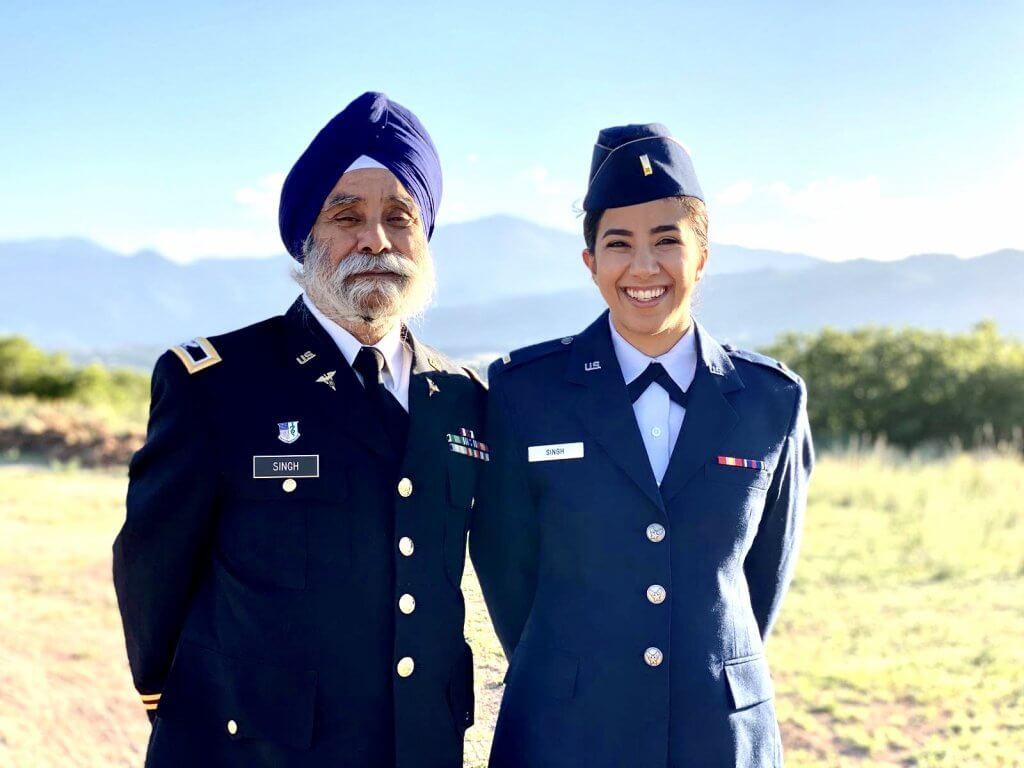Sikhism is the fifth largest world religion, according to the Sikh Coalition, with 500,000 Sikhs living within the U.S. Among the core beliefs is service to humanity, a principle the Singh family hopes to be fulfilling through their military commitment across generations.
Air Force Reserve 2nd Lt. Naureen Singh, 26, grew up watching her father, retired Col. G.B. Singh, serve as an officer in the U.S. Army. Though he was stationed overseas in places like Korea and Germany, her parents made the decision to keep the family in Colorado Springs for stability.
When attending community group events for South Asians or Sikh, Naureen was confused about why her father was the only one in the military.
“It didn’t really click in my head that my dad is a really unique case until I got a lot older,” she said.
The distinctiveness comes into play because as a Sikh there are certain aspects to their faith that made a goal of military service difficult to obtain at the time. Those who identify as Sikh do not believe in cutting any hair on their bodies and most men wear a turban. In fact, the Sikh Coalition states 99% of the people wearing turbans in America are Sikhs.
Both the turban and unshorn hair are considered articles of faith and a constant reminder to remember their values. These two articles in particular create a barrier to a military that prides itself on uniformity.
Singh’s father pursued a commissioning in 1979. Two years later the Department of Defense banned the turban and long hair. Although he was grandfathered in, Naureen says her father felt honor bound to fight for Sikhs to be able to serve while following their faith.
“It was not easy for him. Day in and day out he had an uphill battle trying to be an officer but then also be an officer with a certain faith,” Naureen explained.
She remembers going on base and listening to people question his rank, not believing he was an officer. Despite treatment like this, she said her father had an overwhelmingly positive experience which he credited to having supportive higher ups.
He went on to become one of the highest-ranking Sikhs to keep his turban and serve on active duty, retiring in 2007.
Practicing Sikhs have served in the U.S. military since World War I. Over 80,000 Sikhs died fighting for the allied forces during World War II. Few temporary religious accommodations were granted following the ban in the 1980s, preventing a whole generation of Sikhs from serving.
“I do think it is really important to recognize that when you are diverse of thought or of background, you bring a new voice to the table … that voice can help with mission accomplishment,” Naureen explained.
In 2017, a successful lawsuit opened the door for more Sikhs to join the military without issue, meaning they can file for a religious exemption to wear a turban and beard.
Naureen completed Air Force Officer Training School earlier this year. She began her journey in 2016, inspired by her father’s service. She is also pursuing a Master of Criminal Justice degree from the University of Colorado at Denver.
She shared that she didn’t always know what she wanted to do or that the military would be her path.
“I was born in the states and my parents, who immigrated from India, grew up with a different outlook than mine. I was always too American for my Indian friends and too Indian for my American friends. It was so hard to see where I belonged,” Naureen said.
There were also other struggles growing up that added to the difficulty of finding herself.
“I grew up in the shadows of 9/11. I think growing up after 9/11 and seeing how we equated the turban with terrorism in this country … Here I was trying to fit in, but in media I would see people who had turbans like my dad be projected in a very certain light. That’s why I think I shoved my identity to the side, I didn’t want to make myself stand out,” Naureen said.
After finishing college, she realized thinking that way was detrimental and embraced her identity as a Sikh.
“If you look at Sikh history and especially Sikh soldiers, it makes me meant to be in this force. It took a long time to get there though,” she said with a smile.
Naureen hopes her family’s story and journey will inspire others to serve, adding those aspiring to join the military should just go for it.
“Don’t ever doubt yourself or put restrictions on yourself … Keep pushing. If my dad could do it in the 1970s, anyone can do it.”

